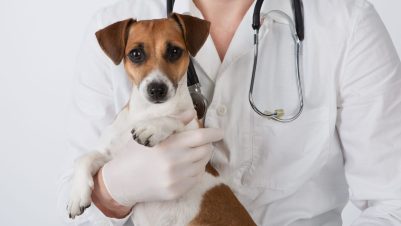Geoff’s practice is called “Remarkable Vets”, but the title is geographical rather than egotistical. The premises are situated on a small hill just outside Arrowtown and are surrounded by pastures which give way to vineyards and mountains. Pigs, goats and deer can be found in the nearest paddocks, along with some of the practice’s other animals.
Arrowtown is about 13 miles from Queenstown, where Geoff’s branch practice is located. Queenstown is a major tourist centre and ski resort, thanks mostly to the Remarkables mountain range, from which Geoff’s remote practice got its name.

Tell me about the veterinary scene in New Zealand compared with the UK
The profession here is regulated by the Veterinary Council of New Zealand, which functions in a similar way to the Royal College of Veterinary Surgeons in the UK. We also have our New Zealand Veterinary Association, founded in 1923, which represents veterinary surgeons and aims to push forward public recognition of the values of the veterinary profession to animals, individual people and society in general. The Association has its eye on the future with a 2030 project which will make sure that the profession is adapting in line with the rapid changes in climate, population and human needs.
How long has your practice been going and how is it developing?
I started out 14 years ago, doing 95 percent of the out-of-hours work. Now we have a one-in-four rota. The practice is still independent with a mixed case load. Cattle breeds include Hereford, Angus, Simmental and Belted Galloway but as it is a high, dry area, there is no dairying. We do about 80 percent small animal, 10 to 12 percent equine and the rest is large animal. Most of our equine patients are pleasure horses with some doing dressage or eventing. On the sheep front, we have the Merino, famous for its fine wool, and cross-bred, half-bred and Perendale for meat production. We have some deer farming as well to add variety.
How do you get along with paraprofessionals? Do you have problems with recruiting and retaining staff as we do in the UK?
Pregnancy testing of sheep, cattle and deer is contracted out to specialist scanners rather than being done by vets in practice. Vets and farriers are working together with many farriers spending time abroad developing their skills. I welcome this cooperation between vet and farrier as it benefits the horse’s treatment. Sadly, physiotherapists are still a rare breed. I have no difficulty in recruiting and keeping staff with a good input of vets from the UK. My biggest problem is finding accommodation for them as Queenstown is full of a transient population of workers serving the tourist trade.

How much are you using innovative technology to advance your practice?
I am moving with the times as much as possible. My digital X-ray is a great advance; I can work faster, get better images and share them with referral vets. Telemedicine has upped the game and cloud-based software allows access to a huge amount of technical data in a cost-effective way. I took on an Idexx in-house laboratory two years ago in response to increased demand and it has proven to be very successful.
On the surgical front, being so isolated has spurred me on to attempt new procedures. I have found that being exposed to challenging situations has been incredibly rewarding. Now we have our own orthopaedic specialist and I find that all my team members are strongly supportive of each other. Client expectations are steadily on the increase and I am confident that the skills offered by the practice are increasing to fill the demand.
How do you get on with referral centres? Does the geography affect practice structure?
Referral is becoming more acceptable these days. My nearest small animal referral centre is in Christchurch, a six-hour drive away, and the nearest equine referral clinic is two and a half hours away. Corporate practices are on the increase, especially in the dairying areas. Dairying is industrial farming and it fits the corporate structure. The population is very spread out so some practices, like my own, find that local small units are best adapted to providing 24-hour care. Even so, some regional practices are struggling just because of the low density of population.
Is the attitude towards animals here much different from how you found it when you worked in the UK?
People are showing an increase in the intensity of the bond between themselves and their pets. This is especially obvious among younger people. I want my practice to continue being family friendly; I attach huge importance to interpersonal skills and excellent communication both within the practice team and between practice and clients. I am happy to live by my practice and for my practice, carrying on the James Herriot tradition.









